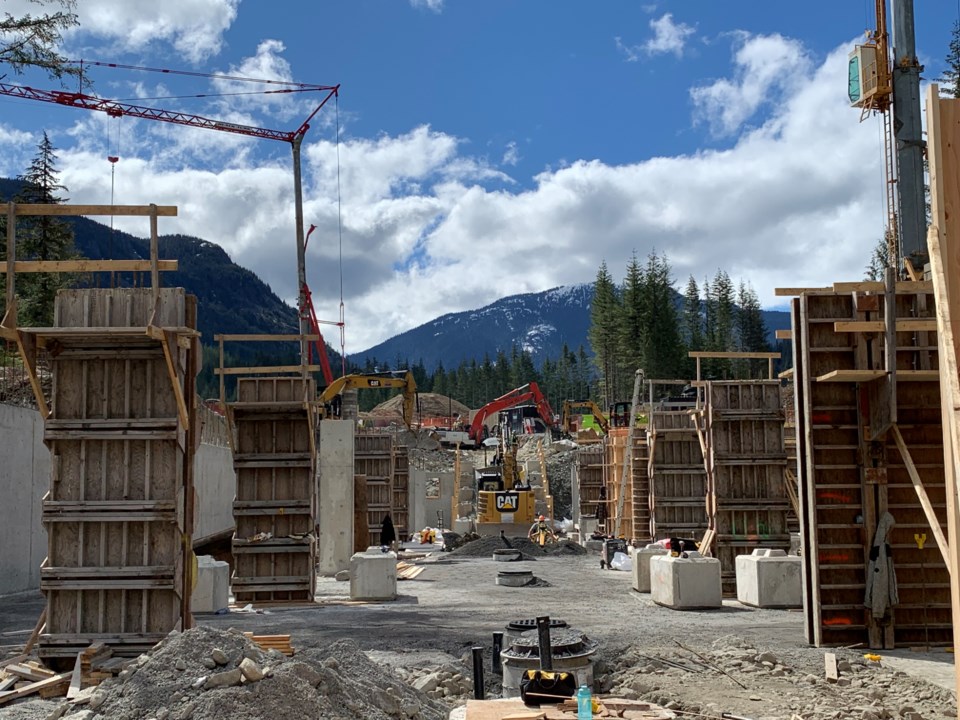Whistler developer Rod Nadeau, of Innovation Building Group, is quite proud of his latest build in Golden, B.C.
The high-performance rental building is “the best-performing apartment building in B.C.,” Nadeau says, and tenants have been moving in since early August.
“The design is people-centered with a large community garden, lots of casual seating, the best coffee shop in Golden with the best patio, EV charging at every parking stall, walking distance to downtown Golden, trails and parks,” he says.
“Since Golden is a very active town like Whistler, we have a workshop building with a ski bench, bike bench with tools, gardening tools and bike storage with e-bike charging.”
Nadeau started the development process in Golden a few years after submitting an application to develop a similar apartment building in Whistler’s White Gold neighbourhood in 2018.
He has since completed two builds in Golden—and has yet to break ground in Whistler.
Since it was first proposed in May 2018, the White Gold application has bounced back and forth between developer and staff, going through numerous design changes, shrinking from 65 units to just 36 at last count.
Council gave a rezoning bylaw for the project first two readings in Sept. 2022. A public hearing followed in November. Nearly a year later, third reading has not taken place.
In its first iteration in May 2018, the proposed rents were $2.31 per square foot. Today, due to higher building costs and interest rates, it’s between $4 and $4.70 per square foot.
Nobody expects a project to break ground weeks after it’s proposed, but the years-long delay on the White Gold build is frankly baffling. Council has stated housing is its No. 1 priority—shouldn’t that mean expediting any and all serviceable housing projects?
Of course, when the project is under the purview of the Resort Municipality of Whistler, delays are not an issue.
One need only look at the expediency applied to any and all regulatory hurdles in Cheakamus Crossing Phase 2, which had its rezoning bylaws drafted and passed and its building permits approved in record time, by Whistler standards.
Let’s be clear: making short work of bureaucratic obstacles so we can build more employee housing is objectively a good thing. But why is the same standard not applied to private developers or other areas of the resort?
Developing in Cheakamus is obviously not an apples-to-apples comparison with developing in White Gold. The Cheakamus land is earmarked for housing, and you’re not going to hear much NIMBYism when it comes time to break ground—the same can’t be said for White Gold.
Even so, it would be nice if the RMOW gave the same urgency and attention to other projects as it does its own.
A similar double standard was on display at the Sept. 26 council meeting, when council voted against the recommendations of its Advisory Design Panel to approve a new addition to municipal hall.
The ADP felt the modular addition was a poor fit, and that “a higher overall design standard should be sought.” But council approved it anyway, following staff’s advice that adding to the annex was the most “cost-effective” and “achievable” solution.
Again, this is objectively a good decision. We should be looking for easy wins wherever we can find them. The sky will not fall if every last building in town doesn’t perfectly reflect our self-important sense of mountain chic.
But why is it OK for the RMOW to relax its rules and ignore its own design panel only when it benefits the municipality itself?
As Councillor Jeff Murl rightly pointed out at the Sept. 26 meeting, the ADP is unlikely to support modular builds in any context.
“I think if you’d shown up anywhere with modular construction, they would have not been happy. It doesn’t matter how you did it, there’s some clear resistance to that. That really made it a hard road for the rest of the presentation,” said Murl, who is council’s representative on the ADP.
An aversion to modular construction “really handicapped them in terms of seeing the benefits to the community, and how quick this is going to be executed, how it serves the workers that can lose their office and get back in [another one] pretty quickly,” Murl continued. “And I think we’re doing a great job of reducing waste by reusing something that’s already there, which in their desire to build something bigger and better would not be the case.”
These are excellent points. Now, take them and apply them to housing for Whistler employees.
Modular builds are incredibly beneficial. They are fast, cheap, and material-efficient, and could mean the difference between a well-staffed resort and one forced to limp through another winter; the difference between a warm, secure bed and leaving town for greener pastures.
When it comes to municipal staff having office-space, the RMOW is perfectly willing to accept these facts; to stand up to stringent design guidelines in the name of efficiency and convenience.
Would officials take the same stance if a proposal for a modular work camp came through the hall? Would we hear the same argument about the clear benefits to the community, and give it a pass for not living up to our own self-glorified standards?
If the urgency given to the White Gold project is any indication—perfectly serviceable from its first iteration all the way back in 2018, and still floundering in bureaucratic purgatory six years later—we’re going to guess no, we wouldn’t.
We don’t need to see modular work camps popping up in every neighbourhood. But the resort would be well-served by dialling back the rigidities of Whistler Exceptionalism to make way for more creative, out-of-the-box solutions—or even just semi-timely approvals for good housing projects.




